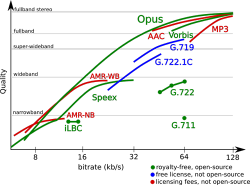Opus audio codec is now an Internet Standard

![]() Opus addresses a full range of bit rates and qualities
The universal "Opus Interactive Audio Codec" has now been standardised as an IETF standard, RFC 6716, giving the web a standard for audio that works for the vast majority of audio traffic, from low bit-rate voice over IP to high bit-rate music. At lower bandwidths Opus uses a linear prediction codec and as bandwidth increases it seamlessly switches to a transform codec to make use of the bandwidth, allowing it to cover a range which traditionally has been covered by six different codecs. The supported rates run from as low as 6Kbit per second in mono, all the way up to 510Kbit per second in stereo. This range, combined with the low algorithmic latency (from 5ms), low power requirements and floating point and fixed point implementations, means it is suitable for most environments.
Opus addresses a full range of bit rates and qualities
The universal "Opus Interactive Audio Codec" has now been standardised as an IETF standard, RFC 6716, giving the web a standard for audio that works for the vast majority of audio traffic, from low bit-rate voice over IP to high bit-rate music. At lower bandwidths Opus uses a linear prediction codec and as bandwidth increases it seamlessly switches to a transform codec to make use of the bandwidth, allowing it to cover a range which traditionally has been covered by six different codecs. The supported rates run from as low as 6Kbit per second in mono, all the way up to 510Kbit per second in stereo. This range, combined with the low algorithmic latency (from 5ms), low power requirements and floating point and fixed point implementations, means it is suitable for most environments.
The liberally licensed and royalty free codec incorporates technology from Skype's SILK and Xiph.org's CELT codecs. There are patents associated with Opus, but these are also available under open source compatible terms to licensees and are expected to only be used to defend the codec from patent attacks.
Opus is already supported by programs such as Firefox, FFmpeg, GStreamer, the foobar2000 media player, the K-Lite Codec pack and LAV Filters. VLC, Rockbox and Mumble will have support soon. The codec will also be used alongside the more traditional G.711 ITU-T standard for audio in WebRTC, the upcoming standard for web-based real-time communications.
An updated version of Opus, 1.0.1, is already available for download with some corrections that did not make the final RFC; source code for the version 1.0.0 reference implementation is also available.
(djwm)
![Kernel Log: Coming in 3.10 (Part 3) [--] Infrastructure](/imgs/43/1/0/4/2/6/7/2/comingin310_4_kicker-4977194bfb0de0d7.png)

![Kernel Log: Coming in 3.10 (Part 3) [--] Infrastructure](/imgs/43/1/0/4/2/3/2/3/comingin310_3_kicker-151cd7b9e9660f05.png)
















